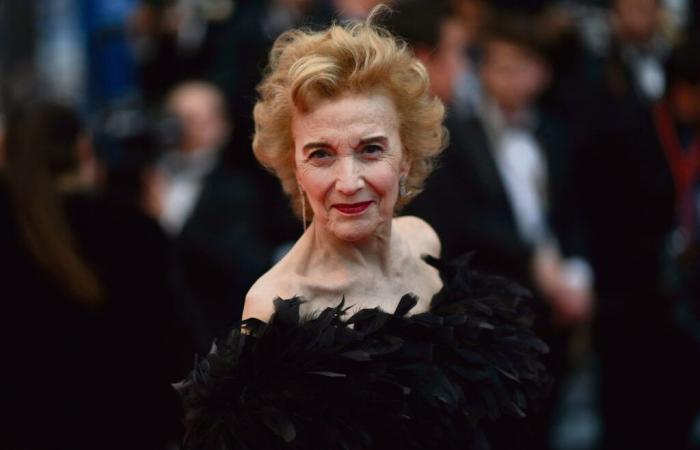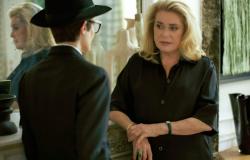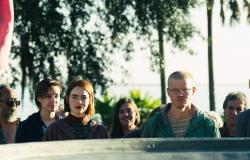For as long as we can remember, there has been the clicking of Stiletto heels which resonate in the deserted streets of Madrid in the early morning. Later, the furious crackle of the typewriter in the Flower of my secret (the Flower of my secret). Her face bathed in tears in front of the mirror of her dressing room in All about my mother.
Her worried and feverish gaze that she places on her son in the skin I live in (The skin I inhabit). Her zaniness in the role of Sister Estiércol (Sister Fumier) for In the Darkness, first film which marks his meeting with Almodovar, and a decisive turning point in his international career.
A smile recognizable among a thousand
Marisa Paredes died at age 78. She was a diva, an actress with crazy charisma, an aristocratic bearing, and great elegance. His voice, hoarse, sensual, was hypnotic. Impeccable diction, she had a particular way of emphasizing words – between two silences, between two fiery looks – which was sometimes melancholy and which suddenly overwhelmed you.
His carmine red smile, beguiling and provocative, recognizable among thousands, burst through the screen. She was not just a “Almodovar chica”, she was much more. An immense, incandescent actress, of the caliber of Gena Rowlands. She has starred in over 70 films with Arturo Ripstein, Manoel de Oliveira, Raul Ruiz, Amos Gitaï, Guillermo del Toro and, of course, Pedro Almodovar.
But also others, less known. It didn’t scare him. In 2021, she lends her voice and face to these anonymous Spanish Republican women in Amparo Climent’s poignant documentary, Lost letters. On television, she was a popular face, starring in many of the dramas that Spaniards loved.
A childhood in poverty and Francoism
Marisa Paredes was born in 1946, into a poor family, in this “post-war” Spain dominated by hunger and Francoist terror. His mother is a concierge in one of these large bourgeois buildings in Santa Ana Square, in the heart of Madrid, where the oldest theater in the capital, the Teatro Español, stands.
Marisa experienced ration tickets. At 11, she left school to work in a sewing workshop. As a child, she once asked her mother: “Why are we poor? » « Being poor is inherited, my daughter. Just as wealth is inherited, so is poverty. » Marisa Paredes never forgot her mother’s words: “They stayed there, engraved in my head”, she recently confided to the magazine Icon.
But at Santa Ana Square, she observes, curiously, the incessant coming and going of the artists in front of the theater, attracted like a magnet by this universe of which she knows nothing. At 16, she finally decided to open the doors. In a black and white country where everything is forbidden, the theater brings color to his life and opens the doors to freedom wide.
“How can they fear freedom so much? »
A free woman, a committed woman, an early feminist, alongside another great actress who recently passed away, Pilar Bardem, Javier’s mother, she is not content to be at all the demonstrations, she takes part in them. heads, singing, dancing to the joyful and irreverent slogans of Spanish feminists.
She mobilized all artists against the war in Iraq while she was president of the Spanish Cinema Academy at the time. In the summer of 2023, she supported the Sumar list and her speaking out to loudly denounce censorship on the part of the right and the far right remains in everyone’s memory: “ How can they fear freedom and culture to this extent? We cannot allow freedom to be trampled on and it will be if we let this handful of madmen do their thing (…) By censoring works, they are the enemies of freedom! »
On November 30, she again participated in a large rally in Madrid to demand an immediate ceasefire in Gaza and Lebanon. Her death provokes, in Spain, countless reactions from many actresses for whom she was a reference, a model, an icon; from directors and actors at the Cannes Film Festival, where she had walked the red carpet many times. But also from Pedro Sanchez, head of the Spanish government or his friend Yolanda Diaz, the Minister of Labor.
Let’s give him the last words: “Cinema is the possibility of moving, of teaching, of thinking, of entertaining, of crying. Cinema is a great universal language. » Goodbye, Marisa…
Closer to those who create
Humanity always claimed the idea that culture is not a commoditythat it is a condition of political life and human emancipation.
Faced with liberal cultural policies, which weaken the public service of culture, the newspaper reports on the resistance of creators and all cultural personnel, but also on the solidarity of the public.
Unusual, daring and unique positions are the hallmark of the newspaper’s culture pages. Our journalists explore behind the scenes of the world of culture and the genesis of the works who make and shake up the news.
Help us defend an ambitious idea of culture!
I want to know more!






